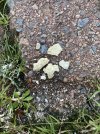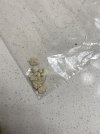You are using an out of date browser. It may not display this or other websites correctly.
You should upgrade or use an alternative browser.
You should upgrade or use an alternative browser.
Stones?
- Thread starter Tori67
- Start date
They look like hard urates. Caused by dehydration and/or the wrong foods. More likely rehydration. Soak in warm water daily for an hour keeping him warm. Also add some romaine to the diet. The urates should be creamy like tooth paste, not hard or gritty.
Why is the bladder being removed?
Tori67
Member
Oh jeez I meant bladder stones!!!! Not bladder
Tori67
Member
Well he has one large bladder stone. He gets warm soaks every day, misted lettuce heavily every day
Tori67
Member
He passes a lot of clear urine, and these hard pieces come with it. His stone is laminated and he did have a lithotripsy to try and break up the stone. I wonder if these are piecesWhy is the bladder being removed?
Attachments
What is pictured is urates that have been passed. No one can tell if they are pieces off of the bigger stone that has formed, or if they are just separate urates that are passing.
Tori67
Member
It is a bit strange though because he is well hydrated. He pees tons of clear liquid. Gets warm soaks every day. Water is provided and his lettuce gets misted.What is pictured is urates that have been passed. No one can tell if they are pieces off of the bigger stone that has formed, or if they are just separate urates that are passing.
What is his diet consisting of?
What temps is he being kept in day, night, basking
What is the humidity?
What species and how old?
What temps is he being kept in day, night, basking
What is the humidity?
What species and how old?
How long has this been his routine? How long have you had him? What do you feed him?It is a bit strange though because he is well hydrated. He pees tons of clear liquid. Gets warm soaks every day. Water is provided and his lettuce gets misted.
Three things to avoid stones: Low protein diet, high level of hydration, large enclosure with lots of walking daily, preferably with some hills in it.
If you feed a lot of higher protein foods, like alfalfa, or if you don't hydrate well enough (which does not seem to be your issue), or if you have the tortoise stuck in a little enclosure indoors for months of every year, stone formation is more likely.
There is also another contributor in my opinion - cool temperatures. Urate precipitation is very much affected by temperature. A tortoise allowed to cool at night will have much greater propensity for the urates to precipitate into stones.How long has this been his routine? How long have you had him? What do you feed him?
Three things to avoid stones: Low protein diet, high level of hydration, large enclosure with lots of walking daily, preferably with some hills in it.
If you feed a lot of higher protein foods, like alfalfa, or if you don't hydrate well enough (which does not seem to be your issue), or if you have the tortoise stuck in a little enclosure indoors for months of every year, stone formation is more likely.
At what temperature are you keeping your tortoise and how cold does it's enclosure/night house get at night?
This is new info for me. I had not heard that before.There is also another contributor in my opinion - cool temperatures. Urate precipitation is very much affected by temperature. A tortoise allowed to cool at night will have much greater propensity for the urates to precipitate into stones.
At what temperature are you keeping your tortoise and how cold does it's enclosure/night house get at night?
This would explain why DTs get them so often when people have them living above ground with our cold CA nights, but then how come hermanni, Russians, and greeks don't seem to get them often? Or does this apply to more tropical species that need warmer temps year round?
Tori67
Member
I’ve had him for about 2 years. I rescued him from a sanctuary, no idea what the previous owners care or diet looked like. He’s been hydrated with baths, etc. but he never showed signs of discomfort until recently which is why he went to the vet to get a CT scan.How long has this been his routine? How long have you had him? What do you feed him?
Three things to avoid stones: Low protein diet, high level of hydration, large enclosure with lots of walking daily, preferably with some hills in it.
If you feed a lot of higher protein foods, like alfalfa, or if you don't hydrate well enough (which does not seem to be your issue), or if you have the tortoise stuck in a little enclosure indoors for months of every year, stone formation is more likely.
He has been in this routine for about 5 months so far. I’ve been making sure he is on a low protein diet, (No pellets or alfalfa hay), he also has a large enclosure outside and inside. He gets usually weeds (plaintain, dandelion, etc) but in winter months he gets spring mix, endive, raddicho, all the safe tortoise foods from the store. This is why I’ve been a little stumped in these rock hard urates. He does have a bladder stone that is large, and he has had a lithotripsy to break off some of the pieces. That is what makes me believe parts of his stone are breaking apart with all this hydration he’s getting
Tori67
Member
This is interesting! I’ve never heard this. He is a Greek, so his temps are 80-85 ambient, 95-100 basking spot, and then cool side of 75-80. His night house doesn’t usually drop below 75 degreesThere is also another contributor in my opinion - cool temperatures. Urate precipitation is very much affected by temperature. A tortoise allowed to cool at night will have much greater propensity for the urates to precipitate into stones.
At what temperature are you keeping your tortoise and how cold does it's enclosure/night house get at night?
Similar threads
New Posts
-
-
-
-
Setting up for a Russian Tortoise - Constructive comments welcome
- Latest: The_Four_Toed_Edward
-

